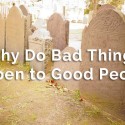This question can take on a few different forms but the essence is usually asking why God would allow pain, suffering, or death to effect a seemingly innocent person. Why Do Bad Things Happen to Good People? How do we answer this question when our peers, family members or friends ask?
IMPORTANT DISCLAIMER
The following is a fairly straightforward, logical response to “Why do bad things happen to good people?” PLEASE remember this however, if a hurting, grieving human being approaches you in their moment of need, they are probably not interested in hearing you launch into a polemic against the existence of “good people.” In those moments we need to be the listening, empathizing, sympathizing hands and feet of Christ. Certainly, your head knowledge will inform your response, and there are definitely times during conversation or debate in which the above is entirely appropriate to share, but deeply hurting and emotional people need your love and compassion in that moment far more than they need a lecture. In other words, know your audience, listen well, and love as you ought.
There are no good people
The main problem with this question is that there are no good people, we are all the bad guys (Romans 3:10-12, Psalm 14:1-3). Human suffering and sin are directly linked to Adam committing the original act of rebellion toward God. God created man “upright” but Adam chose his own path (Genesis 1:26-27, Ecclesiastes 7:29). The apostle Paul specifically points out that all mankind fell with Adam because “all sinned” with him (Romans 5:12). Since that initial rebellion, all of Adam’s descendants have been born corrupted “children of wrath,” sinful and worthy of death (Ephesians 2:3, Psalm 51:5). Because of the rebellion of all mankind, God has no obligation to reduce or eliminate human suffering and death. Martin Luther wrote, “Original sin itself, therefore, leaves free choice with no capacity to do anything but sin and be damned.”[1] Commonly, people will claim that they are “basically good,” but they fail to appreciate the depravity of their sin and fail to recognize that doing a good act does not make them a good person; it makes them someone who did something good (Isaiah 64:6).
Niceness is not the same as goodness
We cannot equate being nice with being good. Even criminals show love and kindness to friends and family (Luke 6:32-34). Ted Bundy, kidnapper, rapist, serial killer and necrophile, was described as “an open smiling young man…the perfect son, the perfect student, the Boy Scout…”[2] Ted Bundy may have been nice, but no one can argue that he was a good person. Frequently, news stories show interviews of friend and family of a person guilty of some atrocity; they proclaim their disbelief, “but he was such a nice young man!”
Avoiding bad choices is not the same as goodness
The avoidance of immoral or criminal action does not equate to goodness. Those who only avoid evil because they want to avoid the consequences are the same as those who do it willfully, because if there were no consequences, those people would likely commit the sinful act (Matthew 5:28, 1 John 3:15).
Disaster and its role in repentance
God can use disaster as a call to repentance. When the tower of Siloam fell and killed 18 people, Jesus used it as an opportunity to call for repentance (Luke 13:1-5). That is not to say that God causes disaster, only that He can use them to a greater purpose. D. A. Carson explains:
“Jesus might have added (as he does elsewhere) that peace and tranquility, which we do not deserve, show us God’s goodness and forbearance. It is a mark of our lostness [sic] that we invert these two. We think we deserve the times of blessing and prosperity, and that the times of war and disaster are not only unfair but come perilously close to calling into question God’s goodness or his power—even, perhaps, his very existence. Jesus simply did not see it that way.”[3]
There are times when God uses suffering as a form of judgement. It is important to underscore that God is a just and holy God; when he uses suffering as a form of judgment, He does it in a way that is irreproachable. He said, ‘You will be consoled when you see their conduct and their actions, for you will know that I have done nothing in it without cause.” (Ezekiel 14:12-23)
What does it all mean?
Since there are no good people, everyone deserves death (Romans 3:23, Ezekiel 18:20, Romans 6:23). That is rough news folks. The good news is that God does not leave us without hope; Jesus died to take the punishment for our bad choices and sin! The debt is paid, will you accept the free gift He is offering to you?
[1]. Martin Luther’s Basic Theological Writings, 2nd ed. ed. Timothy Lull, (Minneapolis: Augsberg Fortress, 2005), 183.
[2]. Ann Rule, The Stranger Beside Me, Updated twentieth anniversary ed. (New York: W. W. Norton & Company, 2000), 10-11.
[3]. D.A. Carson, How Long, o Lord?: Reflections On Suffering and Evil, 2nd ed. (Grand Rapids, MI: Baker Academic, 2006), 61.


Comments
2 responses to “Why Do Bad Things Happen to Good People?”
[…] Why Do Bad Things Happen to Good People? | Youth Apologetics Network […]
[…] we have discussed previously, human suffering and sin are directly linked to Adam committing the original act of rebellion […]